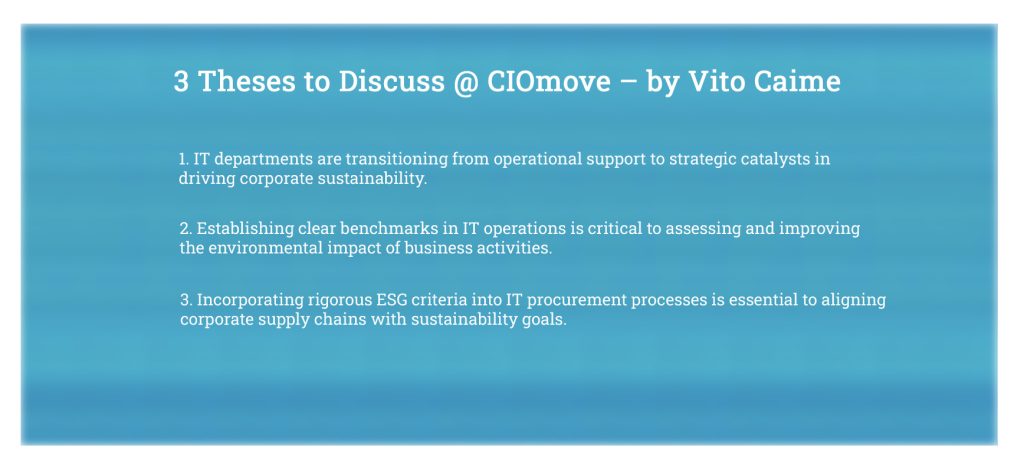
In an era of climate change, the role of the private sector in implementing sustainability initiatives has never been more important. In the run-up to CIOmove@Morocco, we spoke with Vito Caime, Direct Engagement Lead DACH at Logitech, about the impact of IT on corporate sustainability strategy.

As public dissatisfaction with government responses to environmental challenges grows, companies are stepping up, driven by increasing demands from customers and shareholders alike. “These stakeholders are not only vocal about sustainable practices, they are actively holding companies accountable by scrutinizing their environmental, social, and governance (ESG) policies”, says Caime. “Major companies are now transparently reporting on their sustainability efforts and demonstrating how each area of the business, including IT, contributes to ESG goals.”
While IT departments traditionally focus on automating and digitizing processes to reduce energy and resource consumption, the path to significant environmental impact reduction goes beyond operational efficiency. “It extends to making strategic procurement decisions that favor suppliers already committed to sustainable practices”, Caime explains. This shift challenges CIOs to critically evaluate their vendors and supply chains and develop strategies that align with robust ESG standards. “As organizations position themselves for a sustainable future, IT’s role is evolving from back-end support to a key player in achieving broad sustainability goals – proving that every journey to a greener business begins with a single, strategic step.” According to Caime, these steps might include:
Measuring Impact and Establishing Benchmarks
Begin by thoroughly assessing the environmental impact of both your operational practices and your entire supply chain, including all technology products and services that your business utilizes. Establish a comprehensive baseline of your current carbon footprint and other relevant environmental metrics. This benchmark will serve as a critical reference point for future evaluations, enabling you to measure the effectiveness of your purchasing decisions over time. It’s important to systematically track these impacts to identify trends and areas for improvement to ensure that your sourcing strategies are truly helping to reduce your overall carbon footprint.
Setting Purchasing Guidelines and Prioritizing Emissions Reduction
Develop a robust set of requirements and guidelines that will govern all purchasing decisions within your organization. These guidelines should prioritize the reduction of Scope 3 emissions, which encompass indirect emissions from activities such as procurement, waste disposal, and logistics that are not owned or directly controlled by your company but are integral to your operations. Implement a methodical approach to evaluate and select suppliers based on their ability to help you reduce these emissions. This may involve revising procurement policies to give preference to suppliers with a proven lower environmental impact or who are actively engaged in emission reduction initiatives.
Incorporating ESG Criteria into Vendor Selection Processes
Modify your request for proposal (RFP) processes to include mandatory criteria that require all potential suppliers to disclose comprehensive details about their ESG and sustainability practices. These criteria should include aspects such as formal commitments to sustainability, efforts to improve product lifecycle sustainability, and specific environmental and social initiatives they have undertaken. Also include requirements for suppliers to demonstrate a track record of tangible, meaningful impact and evidence of third-party recognition or certification. By integrating these criteria, you can ensure that your supply chain is aligned with your environmental and social values, reinforcing your commitment to sustainability in every facet of your business.
Logitech’s Commitment to Sustainability
When asked how this is done at Logitech, Caime replies: “Equality and the environment are core values at Logitech, and we have made great strides to ensure they are at the center of everything we do. Sustainability is at the core of every design decision, from the moment raw materials are sourced to the end of a product’s life. As a design-led company, we recognize that the greatest opportunities to reduce environmental and improve social impacts occur early in the design process, when key decisions about a product are being made. Similarly, companies can realize the benefits of green IT and software by cultivating a collaborative network of stakeholders throughout the value chain who adhere to green IT principles. Many small changes can add up to big results.”
